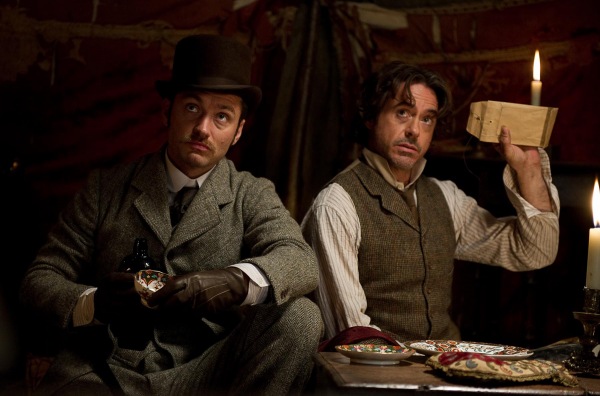If you'd have told me only a couple of years ago that in 2009 I would be leaving a Guy Ritchie film having thoroughly enjoyed myself I would have had a hard time keeping a straight face. And yet Sherlock Holmes just worked, through a combination of dumb-but-fun plotting, Mark Strong doing his best Hammer Horror villain impression and the undeniable chemistry between Robert Downey Jr. and Jude Law. The film was a hit, and two years later we have the inevitable sequel. Strong is out, replaced by Jared Harris as Holmes' nemesis Professor Moriarty, who has an Evil Plan™ that manages to be both fiendishly convoluted and blindingly obvious at the same time; an impressive feat. It had something to do with starting a major world war so that he could profit from the arms trade (Wasn't that also his nefarious plan in The League of Extraordinary Gentlemen? The crafty bugger).
What follows is a thorough, two hour box ticking of the check list of globe-trotting action adventures: Assassins on a train? Check. A night at the opera? Check. Frenchman named Claude who exists purely for reasons of exposition? Check. Ludicrous and totally impractical mountaintop fortress lifted straight out of a Bond film? Check. But just as with it's predecessor, this is a film in which everyone involved seems have realised just how silly it all is, and decided to run with it anyway. Jared Harris makes a fantastic Blofeld to Mark Strong's Dracula, his scenes with Downey Jr. sparking the kind of chemistry that made the first film so enjoyable. Noomi Rapace too proves that she can successfully make the leap to English language films, it's just a shame that she's given something of a non-role. There's also a brilliantly enjoyable and revealing (in more than one sense of the word) cameo from Stephen Fry as Holmes' older brother Mycroft.
That's not to say that the film isn't without it's flaws. There's an overly long detour to Germany that's made even more grating by it's excessive use of slow motion. This was the moment at which I thought my old dislike of Ritchie's flashy, vacuous earlier films would rear it's head, the camera slowing to a crawl every time a character leaped through the air, loaded a gun or blew their nose. Fortunately it's not a lasting problem, and he does redeem himself slightly by using a surprisingly clever gag to turn Holmes and Moriarty's fist fight into mental one. But despite all these flaws and strengths, the reason that it all hangs together is still the relationship between Holmes and Watson, and the film works best when they are bickering and behaving like old women. In their dysfunctional relationship there is some surprisingly good comedy, and in the case of Watson's framing narration, something approaching genuine drama. It's not big and it's certainly not clever, but just as with the first film, it is extremely entertaining.


